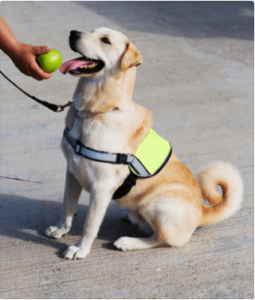
For many people, pets are part of the family. For this reason, pet-friendly properties tend to rent faster and for more money. Tenants are willing to pay a pet fee and even a bit extra in pet rent every month for the privilege of living with their furry friends.
Not every landlord is so in love with pets, however. While they can be great for your rental income and your lower vacancy rates, they also bring a bit of risk to your rental experience. Pets tend to leave messes. They can scratch up floors and flower beds. They can also bite and scratch neighbors.
When you own Goose Creek rental property, you’ll have to give a lot of thought to whether or not you want to allow pets.
Service and companion animals are another story. They are not pets, and when it comes to allowing them into your rental property, you can’t say no. These animals are considered accommodations, and the Fair Housing Act and the Americans with Disabilities Act protect the rights of tenants with disabilities who need them.
Service, Support, and Companion Animals vs. Pets
Service animals, emotional support animals, and companion animals are considered accommodations instead of pets. Rental property owners are legally required to allow reasonable accommodations such as wheelchair ramps, designated parking spots, shower bars, and service animals.
If a tenant has a physical, intellectual, or emotional disability, you cannot deny a service animal, companion animal, or support animal.
There’s more to it than allowing the animal.
When you have a tenant with a service animal, you also cannot charge a pet deposit or a pet fee. You cannot charge any pet rent.
If you don’t want to accept a pet into your rental property, you don’t have to. But, you are required to accept service and support animals, and you cannot deny a tenant who is otherwise qualified for your home just because he or she is moving in with a service animal.
Know Your Rights and Your Restrictions
When your Goose Creek resident needs a service animal for a physical or intellectual disability, it’s usually obvious, and you cannot ask what the service animal is for. For example, a person who is blind will not have to explain their need for a Seeing Eye Dog. Service animals are certified and trained.
However, you can ask for documentation if the disability is not immediately apparent and your tenant is requesting an emotional support animal. Emotional support animals and companion animals are different from service animals in that they can be any type of animal and they aren’t trained to do a specific task or serve a specific purpose. They offer comfort and support.
In these cases, you can request documentation from a medical professional explaining the disability and why the animal is required. Be respectful and professional. If you’re difficult or seem to be doubting the tenant’s need for this accommodation, you can get into legal trouble. Do your due diligence, but don’t set yourself up for a discrimination claim.
Tenant Responsibilities with Service and Companion Animals
 With service animals and companion animals, you cannot ask for extra pet rent, a pet deposit, or a pet fee. You should still collect a security deposit, however, and you can use that deposit at the end of the lease term if there is any damage from the service animal. The tenant is still required to clean up after the animal and ensure it isn’t a nuisance to other tenants or the property.
With service animals and companion animals, you cannot ask for extra pet rent, a pet deposit, or a pet fee. You should still collect a security deposit, however, and you can use that deposit at the end of the lease term if there is any damage from the service animal. The tenant is still required to clean up after the animal and ensure it isn’t a nuisance to other tenants or the property.
Understanding how pets are different from service and support animals is not always easy. Fair housing laws are always changing, and you may need professional Goose Creek property management to keep you compliant. We’d be happy to help. Contact our team at ROG Coastal Property Management.
